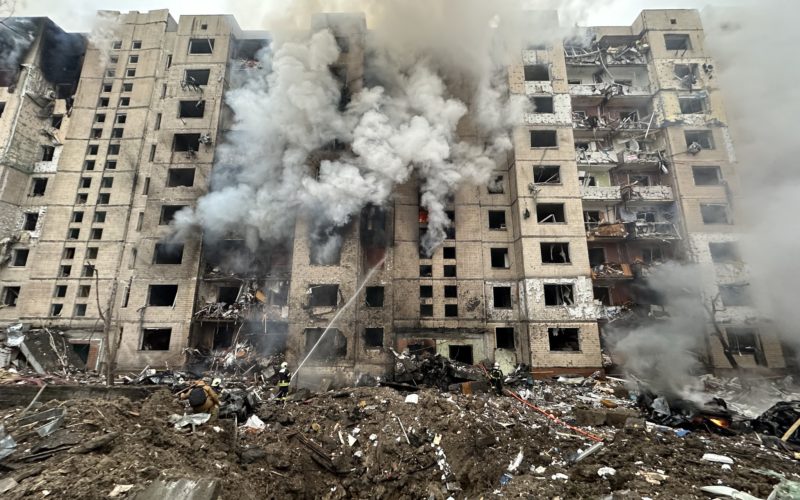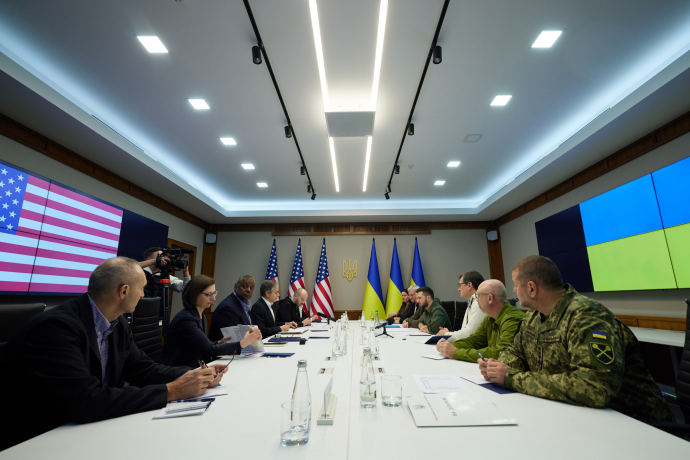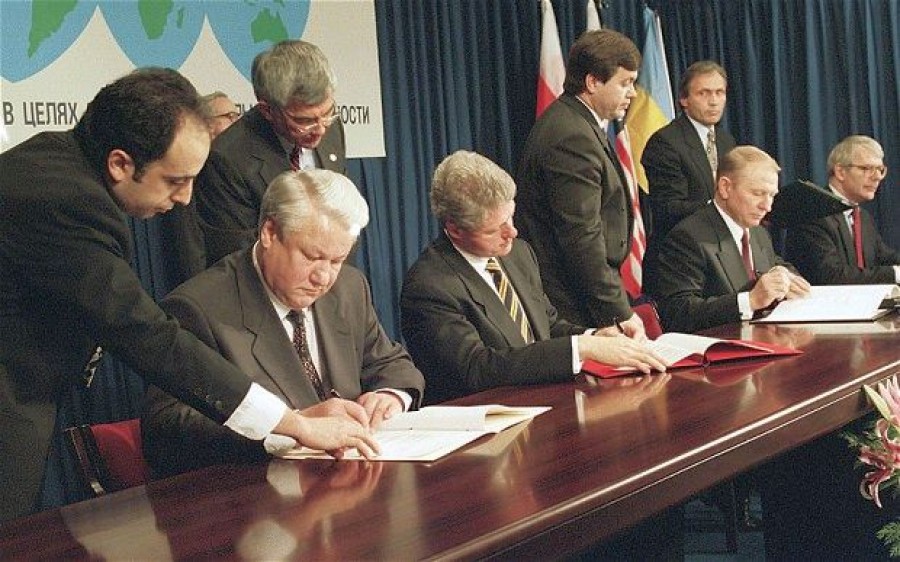My favorite quote of all time is that of General Sir Anthony Cecil Hogmanay Melchett (The TV Series Blackadder Goes Forth): “If nothing else works, a total pig-headed unwillingness to look facts in the face will see us through.” The perception of the war and the calls for negotiations are but two examples of the former.
The calls keep popping up at irregular intervals despite the lack of empirical data suggesting that it would solve anything at all. Between 2014 and 2022, Ukraine held approximately 200 rounds of negotiations with Russia in various formats as well as 20 attempts to establish a cease-fire. For Russia, the negotiations had three purposes: To stop the West from arming Ukraine; to keep the West from engaging directly in the war and most importantly, to ensure victory by non-military means. It was never planning to withdraw and end the war.
On the contrary – and despite hundreds of negotiations -Russia chose to turn peace into a crisis, conflict, and full-scale war.
The many calls for negotiation ignore the effects the proposals have on Russia’s war efforts. They help fuel the war. They confirm its belief that the West will falter, and that victory is within reach.
The calls are also made despite the effect they have on the West. They create the notion that peace is achievable by political means, undermining the US and Europe’s urgent need to invest in security and defence. It reduces the sense of urgency and the need to mobilise the Defence Industrial Base (DIB), rebuild the Armed Forces of the NATO member states and build sustainability. Creating a false hope for peace, the call for negotiation undermines Western support for Ukraine.
The calls are feeble efforts to describe a non-existing way out of a broader confrontation that the West is doing its best to avoid and Russia is doing its best to pursue.
Still, the cynical, ignorant, the naïve, the incompetent or the pro-Russian voices are allowed to inject the folly of negotiation into the public debate.
I recognize that the words chosen are not particularly diplomatic. However, after 10 years of half-hearted attempts – 10 years of increasing horror, suffering, and devastation – it is time to draw a line and acknowledge that the time for diplomacy is behind us.
Russia does not need negotiations to end the war. It simply needs to stop fighting and withdraw. Russia only needs the negotiations to secure a Russian victory.
Just look at the Minsk Agreements from 2014 and 2015.
The Minsk agreements were nothing but a Russian trap and an integrated part of its Hybrid War. The Minsk agreements were accepted as a "peace agreement" even though they were signed under duress and would never have led to peace. One of their obvious shortcomings was that they did not cover the full scale and scope of the Hybrid War Russia was waging. It did not include Crimea. It did not include the maritime domain. It did not limit its use of non-military means.
Russia demanded changes to the Ukrainian constitution and, consequently, a federalization of Ukraine. This would have allowed pro-Russian forces to effectively block any Ukrainian alignment with the EU and NATO. They would be able to stop the reform process. The loss of Western support would have followed suit, leaving Ukraine at the mercy of its aggressive, imperialistic neighbor.
The Minsk Agreements did buy Ukraine time to regenerate and rebuild its Armed Forces. Unfortunately, the agreements concurrently stopped the West from supplying lethal aid to allow Ukraine to re-establish deterrence. The agreements, however, allowed Russia to prepare for a full-scale war. It continued the ongoing process of modernizing its Armed Forces, building new bases and relocating military forces close to Ukraine’s international border, militarise the Crimean Peninsula, establishing, manning, equipping, training, and testing the 1st and 2nd Army Corps inside Donbas, uphold its Hybrid War.
The Western resolve was tested and found lacking mostly because of the Minsk Agreement. It demonstrated extreme cynicism by signing on to a “peace plan” (Minsk Agreement and Protocol) as the only alternative for a peaceful resolution of the war, even though it by default could not possibly secure peace.
When discussing the notion of negotiations 10 years into the war, one first needs to address some key questions. Who are the parties to the war and who should negotiate? What should be negotiated? Why should “someone” negotiate? Are the parties seeking negotiations?
Who should negotiate?
Russia does not see Ukraine as a sovereign and independent country. It is seen as an inevitable part of the Russian Federation. Parts of Ukraine are viewed as Russia’s historical territories. According to Putin, true sovereignty of Ukraine is possible only in “partnership” with Russia. The two populations are falsely portrayed as one people, sharing the same ethnicity, culture, history, and language. Ukraine was never Russia’s enemy.
On 14 December 2023, Putin referred to the war in Ukraine as a “civil war between brothers who stand on different sides [of the conflict]” for which the West is responsible. The point is – and in the words of Vitaliy Portnikov – “the Russian president does not care about the opinion of Ukrainian society at all. He is not going to conduct any negotiations. He treats Ukraine as a rebellious imperial province whose will to resist must be broken by years of war of attrition”.
The West, however, was always defined as Russia’s enemy. Russian foreign policy focuses on its conflict with the West. Not Ukraine.
It’s reflected in its historical narrative It is manifested in President Putin’s article ”On the Historical Unity of Russians and Ukrainians“ from July 2021. It is stated in the article “Where has chaos gone? Unpacking instability” by the former advisor of President Putin, Vladislav Surkov, published only three months before the full-scale invasion. It is echoed in Russia’s “ultimatums” to NATO and the US on 17 December 2021. It is stated in Russia’s new foreign policy doctrine identifying the West as an existential threat. It is not least reflected in its actions, having waged a Hybrid War against both the US and Europe for years.
Russia has strenuously argued that it is at war with the West. It accuses the US, NATO and the EU are waging an information war, economic war, proxy war, hybrid war and total war against Russia. Sanctions are portrayed as an act of aggression.
The Kremlin is arguing that its unprovoked invasion of Ukraine is a part of its total war for national survival. On 14 March 2023, President Putin stressed that “For us, it is a fight for the survival of Russian statehood, because our adversary [the West] […], have one goal – and we know this from previous decades – which is to destabilise us and pull our country apart.”
In July 2023, Colonel-General Andrey Mordvichev, who has been commanding the Central Military District and Russian Central Grouping of Forces in Ukraine, indicated that Russia might have plans to expand the war in Ukraine to Eastern Europe. When asked about how long the war in Ukraine will last, Mordvichev responded that he believes Russia has to attack Eastern Europe. Ukraine is just a stepping stone to other attacks.
His words were recently echoed by the Swedish Chief of Defence, Micael Bydén, stressing that Russia's war in Ukraine is a step, not an end goal in its ambition to establish a sphere of interest." The German Defence Minister, Boris Pistorius, pointed out that Europe could be facing dangers from Russia by the end of this decade. Kaja Kallas, Prime Minister of Estonia, believes that Europe has 3-5 years to prepare for a possible military threat from Russia.
Russia’s war in Ukraine is only a part of a broader confrontation with the West as it is seeking parity with the US and China. Parity at the cost of the West.
Calling for negotiations between Russia and Ukraine is, therefore, rather senseless. Russia is waging war against the West. The Russian Federation is seeking strategic parity with the US. Ukraine is only a small – but crucial – object in its strategy to achieve Great Power status. Ukraine unlocks the economic, technological, demographical, and geostrategic preconditions to establish the power needed to exercise its influence on the European continent.
That’s not to say that Ukraine is not fighting for its very existence. It is. Russia does, however, not see itself fighting Ukraine, but the West that is “fighting Russia, with the help of Ukrainians”.
If calls for negotiations are to have any meaning at all – irrespective of their chance of success - they should call for negotiations between the West and Russia.
What should be negotiated?
The war started on 20 February 2014 despite Russia’s feeble attempt to deny its direct involvement. Russia not only invaded and illegally invaded Crimea, but it also occupied parts of Donbas, started a Hybrid War across Europe, tried to destabilise Ukraine from within, started a maritime blockade of Ukrainian ports in the Sea of Azov and restricted the Freedom of Navigation in the Black Sea.
If we allow ourselves to uphold the rather naïve idea that Ukraine is the end goal of Russia’s war, we need to recognize that Russia had no territorial claims in Ukraine.
Russia recognized its international borders in 1994 when signing the Budapest Memorandum, promising to respect Ukraine's independence and sovereignty in the existing borders. It was reaffirmed in the “The Treaty on Friendship, Cooperation, and Partnership between Ukraine and the Russian Federation” in 1997. The treaty recognised the inviolability of existing borders, respect for territorial integrity and mutual commitment to peaceful settlement of disputes, and the non-use of force or threat of force. It was finally formalised in the 2003 “Treaty between Ukraine and the Russian Federation on the Ukrainian-Russian State border”.
The Crimean Peninsula was acknowledged as Ukrainian right up until the moment Russia invaded and illegally annexed the territory.
Russia stresses that it has never rejected negotiations. Russia “only” demands “denazification, demilitarisation, and a neutral status for Ukraine”. Additionally, Ukraine must accept the "new territorial reality": Russian illegal annexation of Luhansk, Donetsk, Zaporizhzhia, Kherson and Crimea (beyond what it is presently occupying). According to former President Medvedev, "Odesa, Dnipropetrovsk (Dnipro - ed.), Kharkiv, Mykolaiv, Kyiv are Russian cities, like many other temporarily occupied ones." Medvedev highlighted that talks would not change Russia's plans to seek Ukraine's surrender.
I will explain the folly of negotiating any of these demands later. At this stage, it suffices to say that the Russian demands are equal to the elimination of Ukrainian statehood.
When calling for negotiations and territorial compromises, however, one needs to realize that these are not what’s on the table.
Russia is seeking the elimination of Ukraine. That’s not negotiable. Russia might be willing to discuss the timeline (e.g., a temporary ceasefire along the present frontline), but its operational level objective remains the same. Full control over Ukraine.
When calling for negotiations one must acknowledge Russia’s strategic demands.
On 17 December, Russia published both a draft treaty between the USA and the Russian Federation “on security guarantees”, as well as a draft agreement on “measures to ensure the security of the Russian Federation and the Member States of the North Atlantic Treaty Organization”.
NATO was being told to refrain from any further enlargement. Russia wants to regulate NATO force posture in all countries that joined the Alliance after 1997 (Albania, Bulgaria, Croatia, the Czech Republic, Estonia, Hungary, Latvia, Lithuania, Montenegro, North Macedonia, Poland, Romania, Slovakia, and Slovenia). Having started wars in Europe, Russia wants to limit the Alliance's ability to forward deploy units in response to its aggressive foreign policy.
By demanding the USA to refrain from flying heavy bombers or deploying surface warships, including in the framework of the Alliance, in areas “where they can attack targets in the territory” of Russia, they call on NATO in principle to refrain from operating in the Black Sea, the Baltic Sea, the Barents Sea and the Arctic, as well as the airspace over Northern, Central and Eastern Europe.
The USA is being told to withdraw its nuclear weapons from Europe and eliminate all existing infrastructure on the continent.
Russia is in essence demanding a sphere of interest covering not only Georgia, Moldova, and Ukraine but also a greater part of NATO territory.
It is asking the US to withdraw from Europe to the benefit of Russia. It is seeking to redefine the international security architecture.
Should we accept negotiations on these terms, or should we defend our shared values and counter Russian aggression? Calling for Ukrainian concessions will only help strengthen the Russian ultimatums.
Why should “someone” negotiate?
Ukraine has been exposed to 10 years of Russian aggression. A low-intensity conflict has turned into a full-scale war. It is fighting for its right to exist. Presently, 17,8% of its territory is illegally occupied.
The humanitarian costs are massive. While OHCHR has recorded “only” 29,500 civilian casualties so far, information indicates that as many as 150-200,000 might have been killed. The city of Mariupol alone is believed to have suffered 100,000 – 113,000 killed.
More than 6.34 million Ukrainians are refugees and 3.67 million internally displaced persons. Approximately 14.6 million people – a staggering 41% of the current population – now need humanitarian assistance and protection. Additionally, millions have been forcibly displaced to Russia. Ukraine’s demography has undergone dramatic changes due to Russian aggression.
Ukrainian cities and settlements are subject to massive and methodical destruction by Russia. The total amount of direct damage to Ukraine’s infrastructure caused due to the war as of June 2023 exceeded $151,2 billion. 167,200 residential buildings have been destroyed or damaged. Ukraine’s energy sector, industrial and agricultural base are being devastated. With 156,000 square kilometers of territory mined, it has become the most mined country in the world.
A joint assessment from March 2023 by the Government of Ukraine, the World Bank Group, the European Commission, and the United Nations, estimated that the cost of reconstruction and recovery in Ukraine to US $411 billion. Ten months later, the estimate has increased.
Ukraine has also partly lost access to the sea and its maritime resources in its Maritime Exclusive Economic Zone. The maritime cluster – and therefore the Ukrainian economy - is greatly suffering from the Russian maritime blockade and its continuous attacks on its ports and infrastructure. Since 18 July, 180 port infrastructure facilities have been entirely or partially destroyed.
Ukraine, being exposed to genocide, crimes against humanity, ecocide, and massive destruction, desperately wants peace.
If Ukraine believed that negotiations would secure peace, security, and stability it would eagerly seek a political solution to the war. More than 200 rounds of negotiations with Russia in various formats have, however, been held between February 2014 and October 2022.
On 4 October 2022, President Zelensky signed a decree that banned Ukrainian talks with Putin, leaving the door open to talks with a future new president of Russia. “He does not know what dignity and honesty are. Therefore, we are ready for a dialogue with Russia, but with another president of Russia,” Zelensky said.
The decree was signed in response to President Putin's decrees on 29 September to illegally annex Donetsk, Luhansk, Kherson, and Zaporizhzhia oblasts. In a ceremony in the Kremlin, he said Russia would formally incorporate Ukraine— and that the people living there would “be our citizens forever.” The Federation Council unanimously ratified legislation to annex the Ukrainian oblasts on 4 October, following a similar vote in the State Duma the day before.
Ukrainian citizens in occupied territories have since been exposed to an intense “passportification” campaign to force them to accept Russian citizenship. They are “subjected to threats, intimidation, restrictions on humanitarian aid and basic necessities, and possible detention or deportation – all designed to force them to become Russian citizens.”
The Ukrainian decree on negotiations is not least, a result of 10 years of war, atrocities, horror, and destruction. Nearly ten years of negotiations allowed Russia to prepare for a full-scale war.
When Putin allegedly was quietly signaling that he was open to a Cease-Fire in Ukraine, Ukrainians couldn’t hear him over the sound of explosions. On 29 December, Russia launched 158 missiles and drones against Ukraine.
Putin wants to freeze war in Ukraine, claims NYT. Should we believe it?
Given past experience, the ever-escalating war, the level of suffering and destruction, the Russian prerequisites for negotiations and, not least, the fundamental nature of the war, who can rightfully ask Ukraine to negotiate on whether they should live or die?
That is what is at stake.
Ukraine is fighting for its right to exist. Russia is fighting for Great Power status in which the defeat and integration of Ukraine into the Russian Federation is crucial. Having started an unjust and unprovoked war there is no turning back. It has turned friends into enemies. It is either victorious (and a future Great Power) or defeated (and a pariah state in the international community).
The war is, however, no less fundamental for the West. European security is inevitably linked to an independent, sovereign and complete Ukraine. In the words of Borrel: “If Ukraine loses, we lose.”
Ukraine has long defined its preconditions for negotiations. It demands the restoration of territorial integrity, respect for the UN Charter, compensation for all damages caused by the war, punishment of every war criminal and guarantees that this will not happen again. President Zelensky has since presented his 10-point peace plan. The plan calls for the withdrawal of Russian troops, cessation of hostilities, and restoration of Ukraine's state borders with Russia.
Ukraine’s formula for peace: Russia withdraws from Ukraine, returns POWs and deportees, pays reparations – Zelenskyy
Russia should be forced to withdraw. Ukraine should not be forced to negotiate (e.g., by limiting or stopping Western defense aid).
“You were given the choice between war and dishonor. You chose dishonor, and you will have war.” (Winston Churchill to Neville Chamberlain)
Are the parties seeking negotiations in good faith?
For those who care to listen, both Russia and Ukraine have stated their prerequisites for negotiations. Only one of them is according to international law.
There are no signs whatsoever of Russia seeking negotiations in good faith. It did not need to start an unjust war only to seek peace through negotiations. Ten years of an ever-escalating war has shown that Russia only sees negotiations as a tool to influence key policy and decision-makers, media, and public opinion in the West. It is a means to secure a Russian victory.
There is, however, no mismatch between its strategic narrative and its actions on the battlefield if one cares to dig deeper than just its hints of negotiation. It demands a Ukrainian surrender while trying to defeat it on the battlefields: at Land, at Sea, in the Air Space, the Cyber Space and the Cognitive Space. In Ukraine, Europe, and the US.
More importantly, Russia has clearly stated its demands to the US and NATO. The Alliance quickly rejected most of its ultimatums from December 2021. Its prerequisites for negotiations with Ukraine are even less acceptable than its demands to the US and NATO.
Russia is not seeking peace. It is seeking domination.
So why are negotiations presently pointless?
- Russia didn’t start a war in 2014 to end up with no gains 10 years later. On the contrary, an ever-escalating war demonstrates that its strategic aim and objectives remain unchanged. It intends to win and believes that victory is still within reach for lack of Western resolve.
- The war is fundamental. One cannot possibly ask Ukraine to negotiate about their rights to exist. Nor should one expect an imperialistic and aggressive Russia to give up its Great Power ambitions. Both are willing to fight for their aim and objectives, despite only one being just and legitimate.
- More than 200 negotiations and 20 ceasefire agreements did not stop the full-scale invasion. The process has demonstrated that Russia only sees negotiation as a tool to influence key policy and decision-makers, media, and public opinion in the West. It is a means to secure a Russian victory. Ukrainian sovereignty and independence have never been an objective as it in Russia’s perspective, does not exist.
- Russia has violated about four hundred different international treaties to which Ukraine is a party. This includes the UN Charter; UN Convention for the Suppression of the Financing of Terrorism; UN Convention on the Prevention and Punishment of the Crime of Genocide; the Corpus of conventions governing the laws and customs of war; International Convention for the Protection of All Persons from Enforced Disappearance; Convention for the Protection of Cultural Property in the Event of Armed Conflict; UN Convention on the Elimination of All Forms of Racial Discrimination; UN Convention on the Law of the Sea. Russia has violated the CSCE Final Act 1975, the European Convention for the Protection of Human Rights and Fundamental Freedoms, and the Statute of the Council of Europe. It has not least violated the Budapest Memorandum and the “Treaty on Friendship, Cooperation, and Partnership between Ukraine and the Russian Federation”. Russia cannot possibly be trusted to honor a Peace Agreement. Even if Ukraine successfully evicts Russian forces from its territory, Russia will remain a constant threat.
- The idea that Ukraine has no independent identity and no basis to continue to exist as an independent state is deeply rooted in the Russian mindset. Ukraine is, therefore, not a party to Russian negotiations. Russia is only seeking a Ukrainian surrender. Since the “Russia-Ukraine War” is only a part of a broader confrontation between Russia and the West – a battle between the autocratic Russian World and the liberal democracies – any calls for negotiations must be addressed to the West.
- Ukraine has long defined its prerequisites for talks, one being the withdrawal of Russian troops and cessation of hostilities, and restoration of Ukraine's state borders with Russia. That is its starting point for any future talks with Russia. Ukraine – not NATO, the EU, or the US – decides when negotiations on the war in Ukraine are relevant. Negotiation is presently not on the table.
- Given the fundamental nature of the war, any “Peace Agreement” will be only temporary. Freezing the present frontline would be at the peril of Ukraine and, consequently the West. It would be enormously advantages to Russia. Ukraine would be left without any territory to trade when absorbing the initial shock of the next assault. “Major urban areas with total pre-war populations of over five million (a bit over 11% of Ukraine’s total pre-war population) are within 160 kilometres (100 miles) of the current front lines.” While Russia would be able to rest its forces, force generate new forces, rebuild stocks of missiles, ammunition, and drones, and not least, concentrate forces for a decisive assault, Ukraine would be forced to maintain its present forces at high readiness along a 1,200 km long frontline. It would be economically exhausting and tremendously dangerous.
- If Russia succeeds in forcing the West – and consequently Ukraine – to compromise, it will be seen as a Russian victory. The costs of failure will be enormous. The US and NATO have demonstrated their shortcomings and, consequently, lost their ability to deter future conflicts. Russia will emerge as an even more assertive, aggressive, and militarily qualified Great Power at NATO’s borders.
- Insanity is doing the same thing over and over and expecting different results. Having held more than 200 talks to avoid a war Russia was determined to win, it is high time to acknowledge that negotiations cannot possibly resolve the war in Ukraine nor the broader confrontation. Negotiation will not stop Russian aggression. Peace can only be restored through resolve and military power.
Unless, of course, one believes that “a total pig-headed unwillingness to look facts in the face will see us through.”





